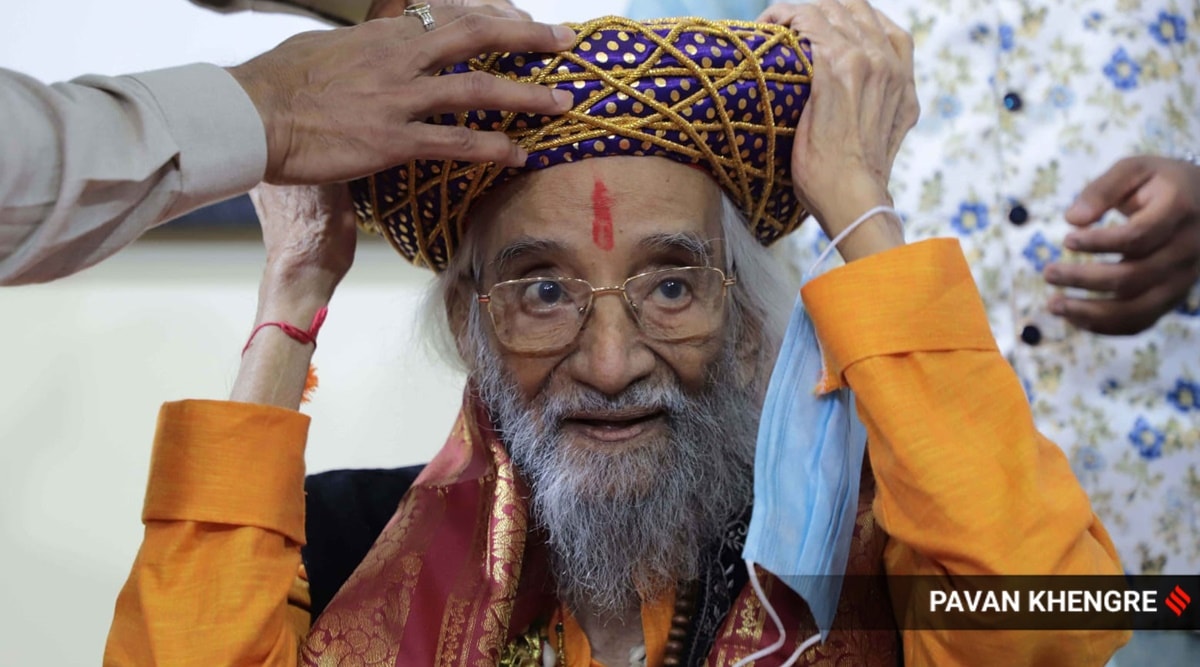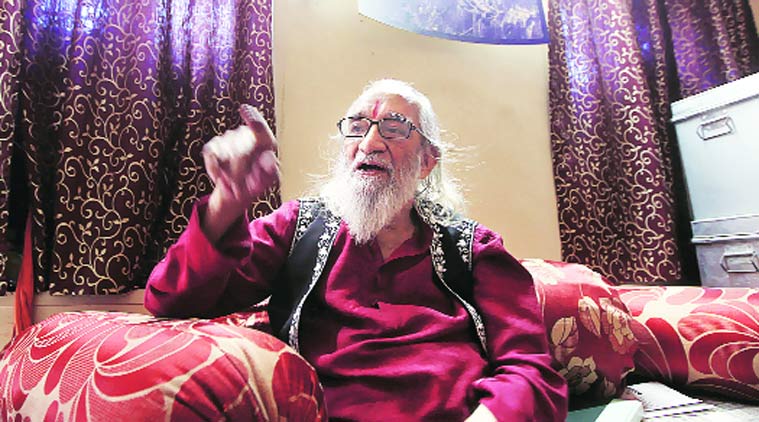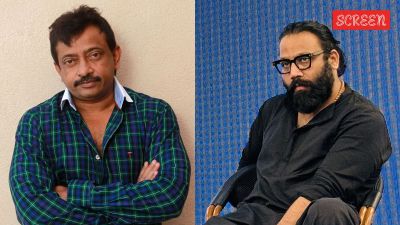Babasaheb Purandare, ‘Shivaji’s Bard’ who brought him alive through stories
In his prolific writing career, Purandare wrote several books, almost exclusively focussing on Shivaii's life and times, including a two-volume biography of 'Raje Shivchhatrapati'.
 Historian Babasaheb Purandare passed away at the age of 99. (Express Photo by Pavan Khengre)
Historian Babasaheb Purandare passed away at the age of 99. (Express Photo by Pavan Khengre)In 1930, when Balwant Purandare was seven, his family had to move out from Pune as a wave of plague had returned to the city. The Purandare family temporarily shifted to a relative’s home in Donje on the city outskirts, at the foothills of Sinhagad Fort. During this stay, the family would visit the fort and Balwant’s father would tell him stories of the fort and King Shivaji’s rendezvous at the hilly citadel which was once called Kondhana.
A young Balwant was so taken by the history and stories of Maratha empire and the ramparts of the forts, that for the next nine decades that would be the sole preoccupation of his life. He would become Babasaheb Purandare, honoured across Maharashtra and beyond as ‘Shiv Shahir’ (Shivaji’s Bard), as a living embodiment of the King Shivaji’s history.
 Raj thackeray pays homage to Babasaheb Purandare at his residence in Pune on Monday. (Express Photo: Pavan Khengre)
Raj thackeray pays homage to Babasaheb Purandare at his residence in Pune on Monday. (Express Photo: Pavan Khengre)
In his prolific writing career, Purandare wrote several books, almost exclusively focussing on Shivaii’s life and times, including a two-volume biography of ‘Raje Shivchhatrapati’. His other prominent publications include ‘Maharaj’, ‘Shelar Khind’, ‘Gadkot Kille’, ‘Agra’, ‘Lal Mahal’, ‘Purandar’, ‘Rajgad’, ‘Panhalgad’, ‘Sinhagad’, ‘Pratapgad’, ‘Fulwanti’, ‘Purandaryanchi Daulat’, ‘Mujaryache Mankari’, ‘Savitri’ and ‘Kalawantinicha Sajja’.
His writings on Shivaji, however, are not liked by all. A number of Maratha organisations have fiercely opposed him for several decades, accusing him of writing the history with a “Brahmanical prism” and deliberately playing up the role played by Dadoji Konddev in Shivaji’s upbringing. When he was awarded with ‘Maharashtra Bhushan’ by the Devendra Fadnavis-led BJP government in the state, several organisations, including Maratha Mahasangh, Sambhaji Brigade and Maratha leaders from NCP and Congress, had opposed the move.
 Babasaheb Purandare was the author of a series of works on Shivaji.
Babasaheb Purandare was the author of a series of works on Shivaji.
In 1978, while on an Europe tour, Purandare saw a few grand Roman ballets held in open area theatres and started working on a similar play on Shivaji’s life. This led to the conception of ‘Janata Raja’, a mega play that became renowned for its grand production design.
According to Diwakar Pande, a long-time associate of Purandare who also directed ‘Janata Raja’, the author wrote him a letter in August 1978 from London telling him about his visit to a theatre to watch Agatha Christie’s murder-mystery play ‘The Moustrap’ and how he was impressed by the play’s presentation.
“After watching the play he sent me a letter from London and told me about his plan to create a grand play on the similar lines of the British plays and Roman ballets. He told me to start working on this idea. When he returned in October of that year, we started doing casting and rehearsals. I was connected to a youth group at that time, so we cast people from that group and elsewhere. Almost all of them were inexperienced. The first casting was that of Shahir, a Class XII boy named Sanjiv Purandare,” said Pande.
The first show was staged on April 14, 1984 at the Renuka Swaroop Girls’ High School and so far, 1,550 shows have been staged across the country.
Purandare, for several decades, travelled across Maharashtra to deliver lectures about Shivaji. He is also known for his significant contribution to the Shiv Sena, along with Bal Thackeray, in the early 70s.
His wife Nirmala Purandare, an activist and educationist, passed away in July 2019. He is survived by two sons, Amrut and Prasad, and a daughter, Madhuri.
The union government had awarded him with the country’s second-highest civilian honour, ‘Padma Vibhushan, in 2019.
He was admitted to Pune’s Deenanath Mangeshkar Hospital on Saturday. “He passed away this morning at about 5.10 am due to old age and pneumonitis. He was on ventilator support since last evening,” said Dr Dhananjay Kelkar, Medical Director, Dinanath Mangeshkar Hospital.







